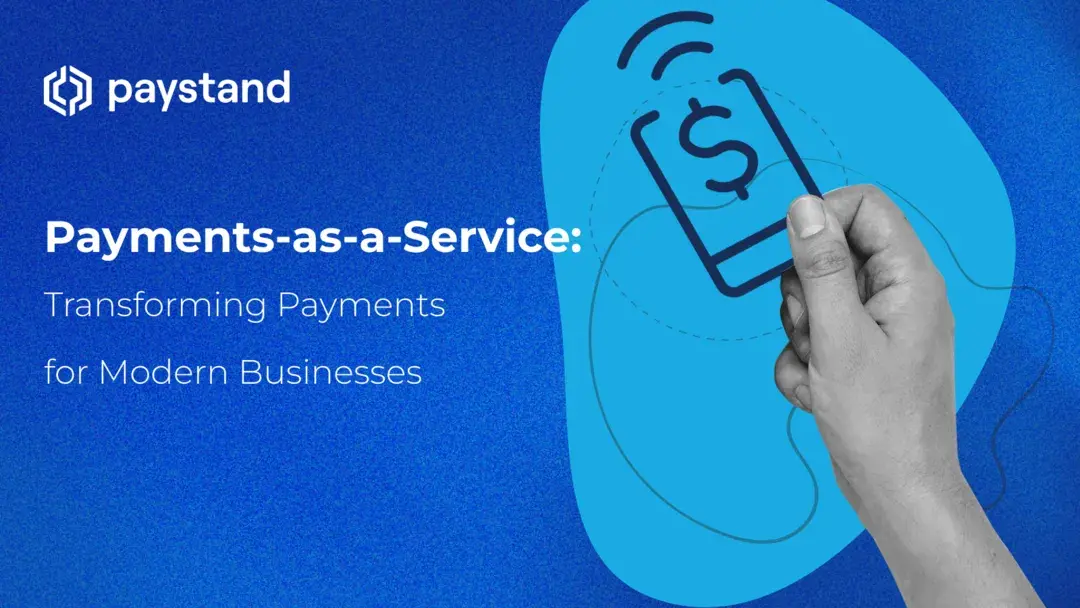Payments-as-a-Service: Transforming Payments for Modern Businesses

In businesses' constant search for the best ways to enhance operations and maintain customer satisfaction, Payments-as-a-Service (PaaS) stands out as a game-changing technology in payment processing. It grants businesses a suite of payment solutions without building and maintaining new systems.
By leveraging the expertise and infrastructure of reputable PaaS providers, businesses can eliminate the complexities and costs associated with developing and managing their payment systems.
Payments-as-a-Service can revolutionize how businesses process payments. With secure, flexible, and scalable payment solutions, PaaS enables businesses to streamline operations, improve customer satisfaction, and stay competitive in today's dynamic financial landscape. Adopting digital payments through PaaS ensures businesses can handle the growing demand for seamless and instant transactions, further solidifying their market position. Keep reading to learn more.
What is Payment as a Service?
Payment-as-a-Service (PaaS) is a cloud-based solution that provides businesses with payment processing infrastructure and tools. This eliminates the need for businesses to develop and maintain payment systems, allowing them to focus on core business operations. PaaS providers handle all aspects of payment processing, including security, compliance, and payment method integration.
PaaS simplifies payment processing with payment gateway integration, transaction routing, fraud detection, and settlement services. By utilizing PaaS, businesses can provide a seamless experience to customers, which is crucial in today's digital economy.
What is PaaS in Banking?
Banks and financial institutions can leverage PaaS to offer advanced payment capabilities without extensive in-house development. This reduces costs, speeds up new feature deployment, and enhances scalability.
PaaS in banking encompasses various services, including:
- Mobile banking payments
- Online transactions
- Peer-to-peer transfers
Banks can stay competitive by offering innovative payment solutions that meet customers' needs. Moreover, PaaS providers ensure that all payment processes comply with stringent regulatory requirements, enhancing security and trust.
Payment-as-a-Service Examples
Several businesses have successfully implemented PaaS solutions to improve their payment processing capabilities. Here are some notable examples:
Paystand
A cloud-based PaaS solution that automates the entire cash cycle. Paystand leverages blockchain technology to offer real-time payments and reduce transaction costs. With features like zero-fee payment processing, automated billing, and comprehensive reporting, Paystand empowers businesses to optimize payment workflows and improve cash flow management.
Stripe
Stripe offers a suite of APIs that enable businesses to accept and manage online payments. It handles the complexities of payment processing, seamlessly integrating payment functionalities into its applications. With features like recurring billing, instant payouts, and support for multiple currencies, Stripe provides a comprehensive PaaS solution for businesses of all sizes.
PayPal
PayPal provides a robust PaaS platform that supports various payment methods, including credit cards, bank transfers, and digital wallets. Its solution simplifies the payment process for both businesses and consumers. PayPal also offers advanced features such as invoicing, payment tracking, and buyer protection, making it a trusted choice for many merchants.
Adyen
Adyen offers a unified payments platform that supports global payments, fraud prevention, and detailed analytics. Its PaaS solution is designed to meet the needs of large enterprises with complex payment requirements. Adyen's platform supports multiple payment methods and currencies, enabling businesses to expand their reach and cater to a global audience.
The Role of SaaS in PaaS
SaaS plays a critical role in implementing PaaS solutions. By leveraging SaaS, businesses can access advanced payment processing capabilities without significant upfront investment in hardware and software. SaaS-based PaaS solutions are typically subscription-based, allowing companies to scale their payment processing capabilities as needed.
SaaS enables continuous updates and improvements to PaaS platforms, ensuring that businesses can always access the latest features and security enhancements. This model facilitates easier integration with other business systems, such as accounting software, CRM systems, and e-commerce platforms, further streamlining operations and enhancing efficiency.
Payments-as-a-Service Benefits
Adopting PaaS offers numerous benefits for businesses, including:
- Cost Efficiency. Reduces the need for costly in-house payment processing infrastructure and development. By utilizing a cloud-based platform, businesses can avoid the expenses of maintaining physical servers and software licenses.
- Scalability. PaaS allows businesses to scale their payment processing capabilities up or down based on demand. Whether experiencing seasonal fluctuations or rapid growth, it can accommodate changing business needs without requiring significant infrastructure changes.
- Security. Ensures payment processing complies with the latest security standards and regulations. PaaS providers implement robust security measures, including encryption, tokenization, and fraud detection, to protect sensitive payment data and prevent unauthorized access.
- Speed to Market. PaaS accelerates the deployment of new payment features and functionalities. With PaaS, businesses can quickly introduce innovative payment solutions and stay ahead of competitors in a rapidly evolving market.
- Focus on Core Operations. Outsourcing payment infrastructure enables businesses to focus on their primary operations while the PaaS provider manages payment processing. Businesses can allocate more resources to product development, customer service, and other strategic initiatives.
Why PaaS is the Future of Payment Processing
Incorporating SaaS to offer Payments as a Service revolutionizes how businesses manage payment processing. By adopting PaaS, companies can enjoy cost savings, enhanced security, and the ability to scale their payment operations effortlessly. This innovative approach is particularly beneficial for businesses looking to stay competitive in an increasingly digital world.
In conclusion, integrating PaaS into your business operations can significantly improve efficiency, reduce costs, and provide a seamless payment experience for your customers. As technology advances, the adoption of PaaS solutions will become increasingly essential for businesses of all sizes.
To explore how blockchain technology can further enhance payment processes, download our ebook, Why B2B Companies Need to Adopt Blockchain Payments. Discover the future of payments and how your business can benefit from these cutting-edge solutions.





